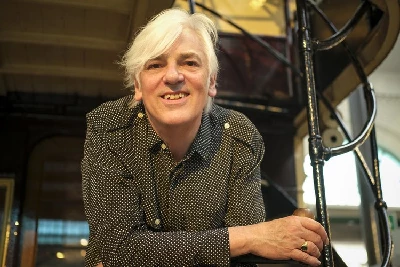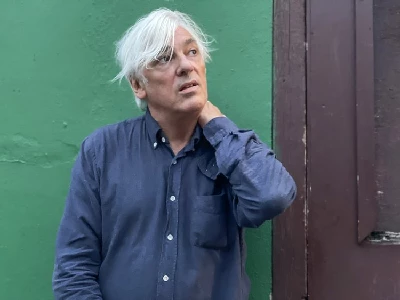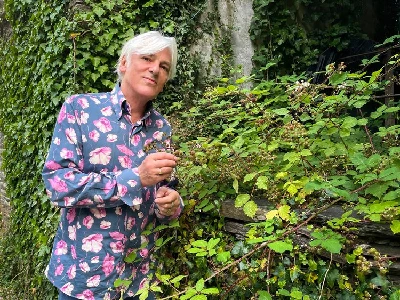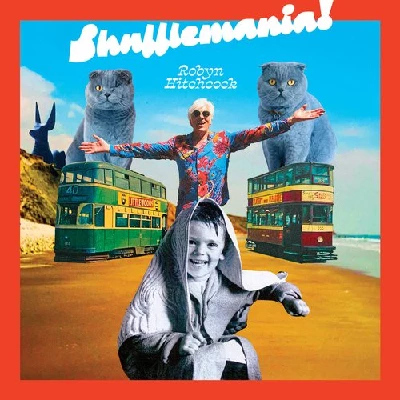published: 20 /
3 /
2023

Singer-songwriter Robyn Hitchcock talks to Eoghan Lyng about his new album 'Shufflemania!' and how both The Beatles and XTC have influenced his work.
Article
Robyn Hitchcock is in fine form. It's not that he's about to return to Ireland, where I live ("We're in the same time zone," Hitchcock chuckles), or that he's just released ‘Shufflemania!’ his best album in twenty years. It's that his dog keeps walking in and out of the zoom call, flitting in and out in a way that's entirely its own. "Dogs are like that," he cackles, and the interview carries on in this droll manner.
Hitchcock is witty, pensive and deeply cognisant of his work, but he doesn't make the mistake of taking himself too seriously. Indeed, he's the first to cop to the influence The Beatles have made on him. During our conversation, both of us attempt to mimic John Lennon, although neither of our efforts stand much of a chance behind the constant tittering. "I can sing like John Lennon, better than I can speak like him," Hitchcock admits, a fact that is verified by the delightfully Beatle-y 'The Inner Life of Scorpio' of ‘Shufflemania!’
"I'm moved emotionally by Lennon's voice in a way that I am not by Paul McCartney's, but they were equal as songwriters," Hitchcock says. "And yes, it's a safe bet to say that I was inspired by them [chuckles]."But unlike the more slavish productions spearheaded by Jeff Lynne and Electric Light Orchestra, Hitchcock imbues enough of his own personality into the work that makes them feel like a continuation of The Beatles narrative, rather than a mere mimic of them.
"I think that's something Andy Partridge would admit to as well [regarding Beatle influences]," Hitchcock says. Well, I'm glad he mentioned the XTC frontman, because Partridge's work, like Hitchcock’s, feels like a time capsule into 1960s psychedelia (‘The Dukes of Stratosphear’ is a particular favourite of mine.) Hitchcock and Partridge pooled their ideas together on the gently lyrical ‘Planet England,’ a strident, kaleidoscopic ode to British eccentricity.
"Andy might be the only person I can actually write a song with," Hitchcock admits. "He's a very good producer and engineer as well, and his mind moves quickly." True, the pair differ when it comes to "covid vaccines,” but what emerges from the interview is one of admiration for the other's talents.
"Andy's had a rough time of it," Hitchcock sighs. "He was an only child, and he was treated fairly badly as a child. He hasn't played a gig for forty years, and part of it was because someone threw away his medication. That's one of the main differences between me and him, in that besides the lockdown, I haven't stopped performing." Considering Partridge's fastidious nature, he may not have had the personality to enjoy a lengthy career as a stage performer.
Hitchcock notes the differences between recording in the studio and singing on a stage. "In the studio, you get a lot of chances to do something again, and again, and again. You can't really do that onstage. I've noticed it myself whenever I've said, 'I think we'll play that again.' Audiences get bored."
Hitchcock clearly thrives on the spontaneity, the danger and the connection, stating that in some ways he prefers the immediacy of the theatre to the laboured channel through studio production. "I will be playing at Whelans [Dublin venue] soon," he chuckles. "I will be celebrating my seventieth there, and I will be playing Mono in Scotland too."
And from the present, Hitchcock decides to leapfrog back to his teenage years, back to the days when the three minute single was king. "'Waterloo Sunset' came out in 1967," Hitchcock says. "It came out in a year with songs like 'Light My Fire', 'Whiter Shade of Pale', Jimi Hendrix and all The Beatles stuff. You can't argue with 'Heroes and Villains' either. ‘Forever Changes’ was the flowering of Arthur Lee, although we didn't get it here in England until 1968."
I find it hard to argue with his logic. I discovered ‘Revolver’ when I was fourteen, and everything from the labyrinthian album cover to the barrelling guitars that makes up 'She Said She Said' left me literally speechless. ‘Revolver’ remains my favourite Beatles album, yet it arrived at a time when I was less eager to intellectualise and more eager to enjoy the importance of the moment. "Fourteen is a very important age," Hitchcock confirms. It is, he says, a bridge between the more care-free adolescence of childhood and the sterner, more cerebral pathways that make up adulthood. "I've seen some fourteen, fifteen-year-olds, and they don't have the diplomacy of adulthood. There's a freedom to that. You say 'fuck that' when you disagree with something, or find it stupid, at that age. You don't subscribe to the diplomacy that adults do."
Like many of our readers, I'm envious of Hitchcock who got to experience the riches Britain produced in the 1960s. An Irishman, Ronan O'Rahilly, played dj and pirate to anyone brave enough to listen to the era. A Welshman, Tom Jones, opened his heart in a style that was rich with emotion and vibrato. And a Scot Donovan, created a finger-plucking technique that proved the blueprint for many of the most emotive hooks of the era. But for Hitchcock, music didn't end there. "There was great pop released up until the 1990s, I’d say," he beams.
Would he care to elaborate? He would. "I actually preferred Oasis to Blur, and you might expect that to be the other way around," Hitchcock cackles. "Oasis wrote songs for kids in a way, like The Beatles, which allowed you to let out your inner kid. Blur went for another frequency; a more sarky [sarcastic] frequency."
For Hitchcock, he says there's no clear way to write a song, but does concede that Graham Gouldman's compositional approach makes sense. (Before joining 10cc in 1972, Gouldman composed some of The Yardbirds most infectious ballads, including 'For Your Love' and 'Heart Full of Soul'.)
"In some ways, it's better to start with the music, because then you know where the words go," Hitchcock concedes. "But a song without words is an instrumental, and a lyric without chords is a poem, essentially."
For Hitchcock, his early compositions were a series of elegies brought to life based on trial and error ("I might try an F sharp, for example.")
"I often start with a title," Hitchcock says, before he pauses to consider his thoughts. "One of my favourite songs on the new album is a song called 'The Man Who Loves The Rain.’ It's based on a Raymond Chandler story he never wrote. I was sent a collection of titles, a list of titles, that he wrote. So, I wrote a song based on that. The line about two graves comes from when I visited the cemetery and I noticed there were two graves with his name on it! I don't know if his wife was buried in one, but it's a song I like from the most recent album."
He's not wrong to highlight 'The Man Who Loves The Rain', but there's enough shadings, colour and suspense on ‘Shufflemania!’ to satiate his fanbase. Fans of Hitchcock range from the aforementioned Andy Partridge to the hosts of Nothing Is Real, who interviewed Hitchcock about The Beatles in 2020: "I'm slowly winding down Twitter, but I think they still have my email."
Hitchcock turns back to his pet, before his mind wanders to the forthcoming shows. He intends to play across Britain and Ireland in 2023. "Audiences can be guaranteed seventy-five minutes of Beatles songs The Beatles never wrote," Hitchcock giggles. "I think that's a good way to describe it. Forty years ago when I started, I only had something like three or four albums. And now it's getting harder to find space for songs from every album, considering I only have seventy-five minutes onstage. If I were to do justice to every album, I would have to do a two-and-a half hour show. Like Paul McCartney, or something.
Band Links:-
http://www.robynhitchcock.com/
http://facebook.com/robynhitchcockoffi
https://twitter.com/RobynHitchcock
https://en.wikipedia.org/wiki/Robyn_Hi
Play in YouTube:-
Picture Gallery:-


